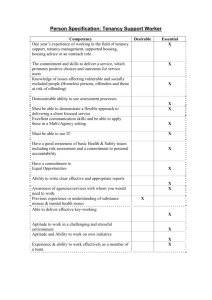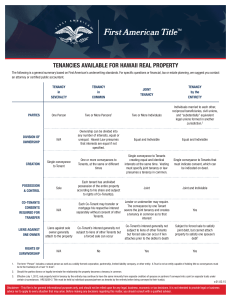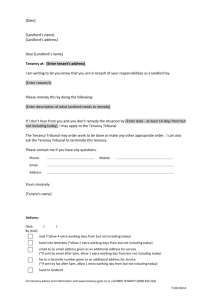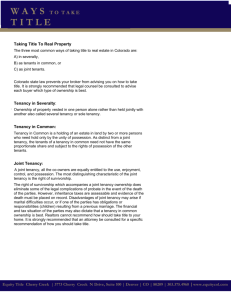Your Tenancy - Keniston Housing Association
advertisement
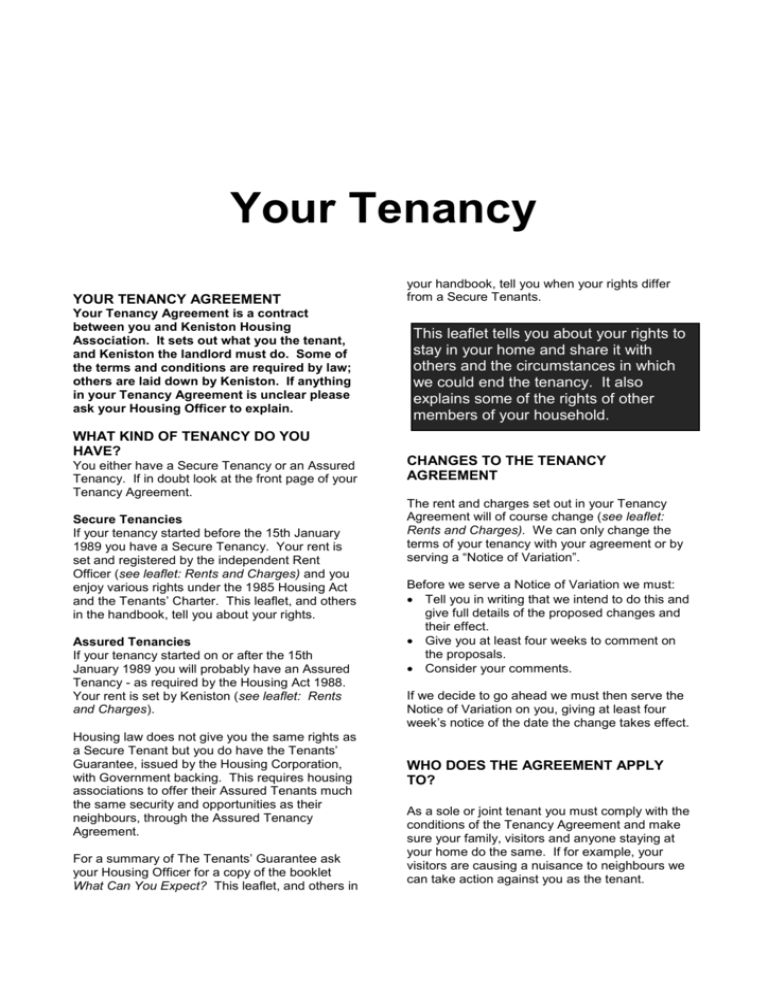
Your Tenancy YOUR TENANCY AGREEMENT Your Tenancy Agreement is a contract between you and Keniston Housing Association. It sets out what you the tenant, and Keniston the landlord must do. Some of the terms and conditions are required by law; others are laid down by Keniston. If anything in your Tenancy Agreement is unclear please ask your Housing Officer to explain. WHAT KIND OF TENANCY DO YOU HAVE? You either have a Secure Tenancy or an Assured Tenancy. If in doubt look at the front page of your Tenancy Agreement. Secure Tenancies If your tenancy started before the 15th January 1989 you have a Secure Tenancy. Your rent is set and registered by the independent Rent Officer (see leaflet: Rents and Charges) and you enjoy various rights under the 1985 Housing Act and the Tenants’ Charter. This leaflet, and others in the handbook, tell you about your rights. Assured Tenancies If your tenancy started on or after the 15th January 1989 you will probably have an Assured Tenancy - as required by the Housing Act 1988. Your rent is set by Keniston (see leaflet: Rents and Charges). Housing law does not give you the same rights as a Secure Tenant but you do have the Tenants’ Guarantee, issued by the Housing Corporation, with Government backing. This requires housing associations to offer their Assured Tenants much the same security and opportunities as their neighbours, through the Assured Tenancy Agreement. For a summary of The Tenants’ Guarantee ask your Housing Officer for a copy of the booklet What Can You Expect? This leaflet, and others in your handbook, tell you when your rights differ from a Secure Tenants. This leaflet tells you about your rights to stay in your home and share it with others and the circumstances in which we could end the tenancy. It also explains some of the rights of other members of your household. CHANGES TO THE TENANCY AGREEMENT The rent and charges set out in your Tenancy Agreement will of course change (see leaflet: Rents and Charges). We can only change the terms of your tenancy with your agreement or by serving a “Notice of Variation”. Before we serve a Notice of Variation we must: Tell you in writing that we intend to do this and give full details of the proposed changes and their effect. Give you at least four weeks to comment on the proposals. Consider your comments. If we decide to go ahead we must then serve the Notice of Variation on you, giving at least four week’s notice of the date the change takes effect. WHO DOES THE AGREEMENT APPLY TO? As a sole or joint tenant you must comply with the conditions of the Tenancy Agreement and make sure your family, visitors and anyone staying at your home do the same. If for example, your visitors are causing a nuisance to neighbours we can take action against you as the tenant. YOUR RIGHTS TO STAY IN YOUR HOME (SECURITY OF TENURE) we will assume you are sub-letting your entire home and may take the property back. You have security of tenure for as long as you use the property as your only or main home and keep to your Tenancy Agreement. TAKING IN A LODGER Eviction We cannot evict you without a court order. We only seek to evict tenants as a last resort if they have seriously broken the Tenancy Agreement and efforts to solve the problem have failed. For example: If you are in persistent rent arrears. You have seriously damaged or neglected the property. You have caused serious or persistent nuisance or annoyance to neighbours or been responsible for an act of harassment. If the property is no longer your main or only home, or if you sub-let the entire property to someone else the Court will automatically grant us an order to re-possess your home. Otherwise we must prove one of the grounds for eviction as set out in your Tenancy Agreement. Grounds for eviction are much the same for secure and assured tenants - although there are circumstances in which the courts must grant us a possession of a property let on an assured tenancy. For secure tenants the court has greater discretion. How do we evict tenants? Before we take any formal action we will write to you. Normally we will also discuss the matter fully with you. Before we start legal proceedings we must serve a “Notice of Seeking Possession” telling you why we want to evict you and when legal proceedings may begin. LEAVING YOUR HOME FOR A TEMPORARY PERIOD It is a good idea to tell us if you are going away for more than a few weeks - for example to look after a relative. Don’t forget to make arrangements for paying the rent and other bills. You can ask someone to live at your home and take care of things while you are away, provided we have agreed in advance. If you do not tell us You can take in a lodger without asking permission from Keniston, provided this will not overcrowd your home (see overcrowding below) A lodger pays you to live in your home but does not have sole use of any part of the house or flat. Please remember: The extra income may affect any benefits you receive. Lodgers have no right to stay in your home if your tenancy ends and Keniston has no responsibility for rehousing them. If you are going to be away for 8 weeks or more you must tell us. If you don’t we will assume you no longer live there and will take the property back. Because people badly need homes we will not usually agree to you being away from home for over a year. SUB-LETTING PART OF YOUR HOME You may sublet part of your home, but you must get Keniston’s written permission first. We usually agree, unless an extra person would make your home overcrowded. If we refuse we will tell you why in writing. A “sub-tenant” has their own private room and may have the use of your kitchen and bathroom but they look after themselves. They pay you rent but have no security of tenure. OVERCROWDING Your Tenancy agreement states the maximum number of people allowed to live in your home. Children under 10 are counted as half a person and babies under a year are disregarded. You must tell Keniston if your household exceeds this “permitted number”. Our homes were designed for less than the “permitted number”. If your family is outgrowing your home ask your Housing Officer about the possibility of transferring to a larger property. THE RIGHT TO BUY Some Secure tenants at Burnhill House, Dromore, Hornsey Road, Nethewode Court (non-sheltered flats), Pound Green Court and Tollington Park and some Assured tenants at Elliotts Row and Hayles Street have the Right to Buy. Other Keniston tenants do not have the Right to Buy, but from time to time there are Government schemes to help you to buy a home elsewhere. Ask your Housing Officer for information. WHO CAN HAVE YOUR TENANCY IF YOU DIE? (SUCCESSION RIGHTS) If you die your wife, husband, common law partner, gay or lesbian partner can take over your tenancy, provided they were occupying the property as their only or main home when you died. If you have no spouse or partner another close relative may take over the tenancy, provided they have been living with you for at least twelve months before your death and are at least 18 years old. “Close relative” means children, parents, brothers, sisters, grandparents, grandchildren, aunts, cousins. People with a right to take over your tenancy are known as successors. If more than one person claims succession, we will give preference to your partner. Otherwise claimants can decide amongst themselves who takes over the tenancy. If they cannot agree the Association will decide. Keniston must be told the successor’s name within a month of tenant’s death. If a member of the family (not the partner) takes over the tenancy and the property is underoccupied by 2 rooms, Keniston may require the new tenant to transfer to a smaller home. If you are sharing your home with a friend at the time of your death, we will consider an application for the tenancy from the friend, although they have no right of succession. Rights of Succession are quite complex. For advice about your particular circumstances contact your Housing Officer. PASSING YOUR TENANCY TO SOMEONE ELSE (ASSIGNMENT) You may not pass your tenancy to someone else unless: the new tenant is someone who would have the Right of Succession if you died (see above). you are exchanging your home with another tenant under your Right to Exchange (see leaflet: Moving On). the court orders you to transfer your tenancy e.g. to your ex-partner following marital breakdown. You must get Keniston’s written permission first. If you try to pass your tenancy on in any other circumstances you will lose all rights to the property and any new occupants will have to leave. RELATIONSHIP BREAKDOWN If you and your partner decide you can no longer live together, a decision has to be made about your joint home. If you can agree who should get the tenancy A couple who are joint tenants should tell us in writing whose name should be removed from the Tenancy Agreement. If you are the sole tenant but wish your partner to have the home, contact your Housing Officer to discuss the matter. If you cannot agree You will need advice from a solicitor or housing advice centre. Here are some brief guidelines: Keniston cannot take someone’s name off the tenancy without their written consent or a court order. If you are married, the divorce court can transfer the tenancy to whichever partner needs it most. Until a property settlement order is made a husband and wife have equal rights to the home (even if the tenancy is only in one name). If you are not married and have no children, the Court cannot change the Tenancy Agreement. Joint tenants must come to an agreement about who gets the tenancy. A sole tenant can require their ex-partner to leave by a Court Order. If you are not married but have a family, the Court can grant the tenancy to whoever has care and control of the children. We regret we cannot offer alternative accommodation to the person moving out of the partnership home. DOMESTIC VIOLENCE If you are suffering violence at home we will do what we can to help. Depending on the circumstances we may be able to grant you a new tenancy in your own name, or transfer you to another area. If you are married we will generally support any application for an Order for the transfer of a tenancy under the Matrimonial Causes Act. If you are in immediate danger you should contact the police. If you cannot stay at home or find temporary accommodation with friends or relative contact the council’s Housing Department or Women’s Aid Refuge (National Helpline Tel: 08457 023468) Out of office hours your local police will be able to contact the emergency duty team of Social Services. Keniston is committed to equal opportunities in employment and service delivery. If you would like a translation of any of our leaflets into a foreign language, please let us know. February 2007 M:\kha\infoleaf\your tenancy.doc


